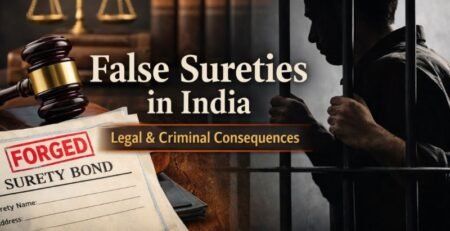Sedition Law in India Explained Understanding Section One Two Four A
The sedition law in India has remained one of the most debated and controversial provisions in the criminal justice system. Rooted in colonial history, Section One Two Four A of the Indian Penal Code was introduced to curb dissent against the British government. Even decades after independence, the provision continues to spark legal, political, and constitutional debates. Understanding what sedition law means, how it is applied, and why it is controversial is essential for citizens, legal professionals, and policymakers alike.
This article explains the concept of sedition law in India, its legal framework, judicial interpretation, constitutional concerns, and recent developments in a simple and comprehensive manner.
What Is Sedition Under Indian Law
Sedition is defined under Section One Two Four A of the Indian Penal Code. It criminalizes acts that bring or attempt to bring hatred, contempt, or disaffection towards the Government of India through words, signs, or visible representation.
Disaffection includes disloyalty and feelings of enmity. However, the law also clarifies that lawful criticism of government actions, without inciting hatred or violence, does not amount to sedition.
In simple terms, sedition law aims to punish actions that threaten the authority of the state by inciting rebellion or public disorder.
Historical Background of Sedition Law in India
The sedition provision was introduced in the year eighteen seventy during British rule. Its primary purpose was to suppress voices that challenged colonial authority. Several Indian freedom fighters were prosecuted under this law, including Bal Gangadhar Tilak and Mahatma Gandhi.
Mahatma Gandhi famously described Section One Two Four A as “the prince among the political sections of the Indian Penal Code designed to suppress the liberty of the citizen.”
Despite gaining independence, India retained this provision, arguing that national security and public order required such a law. However, its colonial origin continues to fuel criticism and demands for reform.
Essential Ingredients of Sedition
For an act to qualify as sedition, certain essential elements must be present:
There must be words spoken or written, signs, or visible representations
The act must bring or attempt to bring hatred, contempt, or disaffection
The target must be the Government of India
There must be an intention or tendency to cause public disorder or violence
Merely expressing dissatisfaction or criticism of government policies does not automatically amount to sedition.
Punishment for Sedition in India
Section One Two Four A prescribes severe punishment. A person convicted of sedition may face:
Imprisonment for life with or without fine
Imprisonment up to three years with fine
Fine alone
Sedition is classified as a cognizable, non bailable, and non compoundable offence, making it a powerful tool in the hands of law enforcement agencies.
Constitutional Validity of Sedition Law
The sedition law directly intersects with the fundamental right to freedom of speech and expression guaranteed under Article Nineteen One A of the Constitution.
While freedom of speech is not absolute, restrictions must be reasonable and fall within the limits of Article Nineteen Two, which includes public order, security of the state, and sovereignty and integrity of India.
The main constitutional challenge against sedition law is that its vague and broad language allows misuse, chilling free speech and democratic dissent.
Landmark Supreme Court Judgments on Sedition
Kedar Nath Singh v State of Bihar
This landmark judgment upheld the constitutional validity of Section One Two Four A but limited its scope. The Supreme Court ruled that sedition applies only when speech or actions incite violence or have a tendency to create public disorder.
Mere criticism of the government, even if strongly worded, cannot be considered sedition unless it leads to violence or disturbance of law and order.
Balwant Singh v State of Punjab
In this case, the Supreme Court held that casual slogans without any intention to incite violence do not amount to sedition. The judgment reinforced the requirement of incitement to public disorder.
Recent Supreme Court Observations
In recent years, the Supreme Court has expressed serious concern over the misuse of sedition law. The Court questioned whether a colonial era law is still necessary in a modern democracy and emphasized the need to balance national security with individual liberties.
Misuse and Concerns Around Sedition Law
One of the biggest criticisms of sedition law in India is its frequent misuse. Journalists, activists, students, and political opponents have been charged with sedition for expressing dissenting views.
Common concerns include:
Use of sedition to silence criticism
Arbitrary arrests without sufficient evidence
Long legal battles even when cases do not stand scrutiny
Chilling effect on free speech and journalism
These concerns have led to demands for repeal or significant amendment of the law.
Difference Between Dissent and Sedition
A democratic society thrives on dissent. Criticizing government policies, questioning authority, and expressing unpopular opinions are part of democratic discourse.
Sedition crosses the line only when dissent turns into incitement to violence or attempts to overthrow the government through unlawful means. The challenge lies in ensuring that this distinction is respected in practice, not just in theory.
Current Status of Sedition Law in India
In recent developments, the Government of India has stated that the sedition provision is under reconsideration. The Supreme Court has also directed that no new sedition cases should be registered until the law is reviewed.
This marks a significant shift and opens the door for possible reform or repeal. Legal experts believe that clearer guidelines or alternative laws dealing with national security may replace the existing provision.
Is Sedition Law Still Necessary
Supporters of sedition law argue that it is essential to protect national integrity, sovereignty, and public order, especially in the face of terrorism and anti national activities.
Opponents argue that existing laws related to unlawful activities, terrorism, and public order are sufficient, making sedition law redundant and dangerous.
The debate ultimately revolves around finding a balance between safeguarding the state and preserving democratic freedoms.
Way Forward
India stands at a crucial juncture in redefining its approach to sedition. Any reform must ensure:
Clear and narrow definitions
Protection of free speech
Safeguards against misuse
Strong action against genuine threats to national security
Legal clarity and judicial oversight will play a vital role in shaping the future of sedition law in India.
Final Thoughts
Sedition law in India, embodied in Section One Two Four A, represents a complex intersection of history, security, and constitutional rights. While its intent may be to protect the state, its application has often raised serious concerns about civil liberties. Legal experts at Global Judex Law Firm observe that the broad interpretation of this provision has, at times, conflicted with the fundamental right to free expression.
As India continues to evolve as a democratic nation, reexamining colonial era laws through the lens of constitutional values is not just necessary but inevitable. A transparent and balanced legal framework, supported by informed legal guidance from institutions like Global Judex Law Firm, will help ensure that national security is preserved without compromising the fundamental right to freedom of expression.









